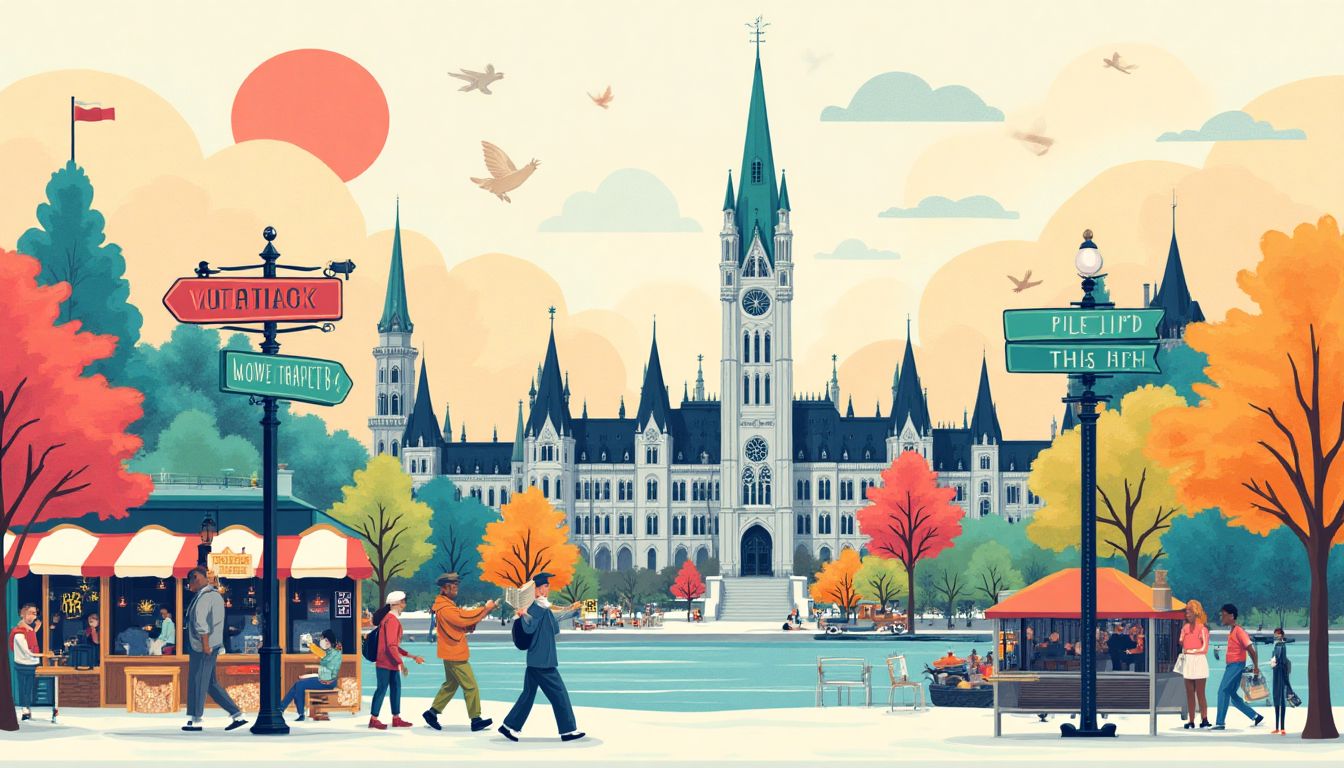Ottawa, Canada’s capital, is a city where the aroma of poutine mingles with the sound of parliamentary debates. But here’s the twist: while the city is officially bilingual, you might wonder if you can survive here without uttering a single "bonjour." Can you live in Ottawa without speaking French? The answer is yes, but it’s not as straightforward as ordering a double-double at Tim Hortons. Ottawa’s linguistic landscape is a fascinating mix of English and French, shaped by history, culture, and politics. Renowned linguist Noam Chomsky once said, "Language is a window into human nature," and Ottawa’s bilingualism offers a unique view into Canada’s identity. Similarly, Malcolm Gladwell, in his book Outliers, explores how cultural context shapes success, and Ottawa’s bilingual environment is a prime example. Even Steven Pinker, a cognitive scientist, has highlighted the cognitive benefits of bilingualism. So, can you thrive in Ottawa without French? Let’s explore.
For more information about Ottawa’s local news, events, and resources, visit inthacity.com/headlines/canada/ottawa-news.php.
The Linguistic Landscape of Ottawa
Ottawa’s bilingualism is like a well-choreographed dance between English and French. While the city is officially bilingual, the balance between the two languages varies depending on where you are. Downtown Ottawa, home to Parliament Hill and government offices, is a hub of bilingual activity. Here, you’ll hear both languages in meetings, on street signs, and in casual conversations. But venture into neighborhoods like Westboro or Kanata, and English takes center stage. These areas are predominantly English-speaking, making them ideal for newcomers who aren’t fluent in French.
Bilingualism in Ottawa: A City of Two Languages
Ottawa’s bilingualism is rooted in Canada’s history. The Official Languages Act of 1969 made English and French the country’s official languages, and Ottawa, as the capital, embodies this policy. Government institutions, including the Parliament of Canada, operate in both languages. This means that if you’re working in the public sector, bilingualism is often a requirement. However, in the private sector, English is usually sufficient.
Neighborhoods Where English Dominates
If you’re an English speaker, neighborhoods like Nepean, Kanata, and Westboro will feel like home. These areas are known for their English-speaking communities, making it easier to navigate daily life without French. Grocery stores, restaurants, and schools in these neighborhoods primarily operate in English, so you won’t feel out of place. For example, Kanata, a suburb of Ottawa, is a tech hub with a strong English-speaking population.
Areas Where French is More Prevalent
On the flip side, areas like Vanier and parts of the ByWard Market have a stronger French presence. Gatineau, just across the river in Quebec, is predominantly French-speaking. If you’re planning to explore these areas, knowing some basic French phrases can go a long way. For instance, ordering a "croissant" in French at a bakery in the ByWard Market might earn you a smile and a warm "merci."
The Role of French in Government Institutions
If you’re eyeing a job in the federal government, French is often a must. Many positions require bilingualism, especially those involving public service or communication. The Public Service Commission of Canada offers language training to help employees meet these requirements. Even if you’re not fluent, showing an effort to learn French can boost your career prospects in Ottawa’s government sector.
Daily Life Without French: Challenges and Opportunities
Living in Ottawa without speaking French is like navigating a bilingual traffic light—most of the time, you’ll get the green signal, but occasionally, you’ll hit a red. Grocery shopping, dining out, and visiting retail stores are generally smooth sailing in English. However, stepping into a Pâtisserie might feel like a crash course in French vocabulary. Pro tip: Pointing at pastries with a smile usually works wonders.
Public transportation is another area where English speakers can breathe easy. The OC Transpo system is user-friendly, with announcements and signage in both languages. But if you find yourself in Gatineau—Ottawa’s French-speaking neighbor across the river—knowing how to say “arrêt” (stop) might save you from some confusion.
Healthcare and emergency services in Ottawa are accessible in English, ensuring you can describe your symptoms or request help without stumbling over translations. That said, learning basic medical terms in French could come in handy, especially if you’re visiting a specialist or pharmacy in a predominantly French area. Imagine trying to explain a headache without knowing the word for “pain”—it’s a headache in itself!
Social interactions and community building are where the language barrier might feel more pronounced. While most Ottawans are happy to switch to English, making an effort to speak French can open doors to deeper connections. Joining local meetups or attending community events like the Ottawa Bluesfest can help you blend into the city’s vibrant cultural tapestry. Plus, who doesn’t love bonding over shared interests—or shared confusion during a karaoke night?
The Importance of French in the Workplace
Ottawa’s job market is a mixed bag for non-French speakers. If you’re eyeing a government position, bilingualism is often a non-negotiable requirement. However, the private sector is more forgiving, with many companies operating primarily in English. For instance, tech startups and multinational corporations often prioritize skills over language proficiency. Still, knowing French can give your resume an edge—think of it as the cherry on top of your career sundae.
For those in customer-facing roles, French is often a must. Picture this: You’re working at a café, and a customer asks for a “café au lait” while gesturing wildly. Knowing what they’re asking for could turn a potentially awkward moment into a delightful interaction. Even if your job doesn’t require French, being able to sprinkle in a few phrases can impress your colleagues and clients.
If you’re serious about advancing your career in Ottawa, consider investing time in learning French. Resources like the Alliance Française offer classes tailored to different proficiency levels. And if attending in-person classes feels daunting, apps like Duolingo and Babbel can help you practice on the go. Remember, even a little French goes a long way—bonjour, après-midi, and merci can be the start of your bilingual journey.
The value of bilingualism in career advancement cannot be overstated. It’s not just about job requirements; it’s about demonstrating adaptability and cultural awareness. In a city where French and English coexist, being fluent in both languages can set you apart in a competitive job market. Plus, it’s a great conversation starter—just don’t mention the Habs unless you’re ready for a lively debate!
Cultural Integration and Community Support
Ottawa’s bilingual culture isn’t just about language—it’s about community. Whether you’re a newcomer or a long-time resident, integrating into Ottawa’s vibrant cultural scene can be both rewarding and fun. Here’s how you can immerse yourself in the city’s bilingual lifestyle and find support along the way.
French Language Classes and Meetups
If you’re eager to learn French, Ottawa offers a variety of resources. The Alliance Française Ottawa is a fantastic place to start, offering classes for all levels. For a more casual approach, check out local meetups like French Language Meetups, where you can practice conversational French in a relaxed setting. These gatherings are perfect for building confidence and making new friends.
Cultural Events and Festivals
Ottawa is home to numerous cultural events that celebrate its bilingual heritage. The Ottawa Festivals website lists events like Winterlude and the Franco-Ontarian Festival, where you can experience French culture firsthand. These events are not only entertaining but also provide a great opportunity to practice your French in a fun, immersive environment.
Volunteering and Networking Opportunities
Volunteering is another excellent way to integrate into Ottawa’s bilingual community. Organizations like Volunteer Ottawa often have opportunities that require or encourage bilingualism. Networking events, such as those hosted by the Ottawa Board of Trade, can also help you connect with professionals who value bilingual skills.
The Role of Technology in Breaking Language Barriers
Technology can be a game-changer for non-French speakers in Ottawa. Apps like Duolingo and Babbel make learning French accessible and fun. Additionally, AI-powered translation tools like Google Translate can help you navigate everyday situations, from reading signs to ordering food. These tools are especially useful for those just starting their bilingual journey.
Future Trends: Is English Enough in Ottawa?
As Ottawa continues to grow and evolve, the role of English in the city’s linguistic landscape is shifting. Here’s a look at the trends shaping the future of bilingualism in Canada’s capital and what it means for non-French speakers.
The Growing Influence of Immigrants in Ottawa
Ottawa’s immigrant population is on the rise, bringing with it a diversity of languages and cultures. According to Statistics Canada, over 20% of Ottawa’s population is foreign-born. This influx is gradually shifting the city’s linguistic dynamics, with English becoming more dominant in certain areas. However, French remains a key part of Ottawa’s identity, especially in government and cultural institutions.
The Role of English in a Globalized World
In a globalized world, English is often seen as the lingua franca. This is particularly true in Ottawa, where many international organizations and businesses operate. While French is important for local integration, English can open doors to global opportunities. For example, tech companies like Shopify, headquartered in Ottawa, often operate primarily in English, making it a viable option for non-French speakers.
Government Policies Promoting Bilingualism
The Canadian government continues to promote bilingualism through policies and initiatives. Programs like the Official Languages Support Programs aim to strengthen French language education and services. While these efforts ensure French remains a cornerstone of Ottawa’s culture, they also provide resources for English speakers to learn French and integrate more fully into the community.
Personal Stories: Living in Ottawa Without French
Many people have successfully built lives in Ottawa without speaking French. Take Sarah, a software developer from Toronto, who moved to Ottawa for a job at Nortel Networks. While she initially struggled with the language barrier, she found that English was sufficient for her daily needs. Over time, she took French classes and now enjoys a richer, more integrated experience in the city. Stories like Sarah’s highlight the possibilities and challenges of living in Ottawa without French.
Future Horizons: How AI Could Revolutionize Bilingual Living in Ottawa
Imagine a future where language barriers are a thing of the past, where AI seamlessly bridges the gap between English and French in Ottawa. This isn’t science fiction—it’s a tangible reality that’s already taking shape. As Ottawa’s bilingualism continues to evolve, AI is poised to play a transformative role in helping non-French speakers navigate the city’s linguistic landscape. Here’s how:
Real-Time Translation Apps: Breaking Down Barriers
AI-powered apps like Google Translate are already making life easier for travelers and expats. But imagine a version tailored specifically for Ottawa’s bilingual context. Such an app could offer context-aware translations, such as translating a French menu when you enter a restaurant or providing real-time subtitles for French TV shows. Companies like DeepL, known for their accurate translations, could develop Ottawa-specific modules, incorporating local slang and cultural nuances.
Language Learning Platforms: Master French Faster
Platforms like Duolingo and Babbel could create Ottawa-focused programs, teaching practical phrases and cultural etiquette. AI could adapt lessons based on your daily interactions, ensuring you learn what’s most relevant. For instance, if you frequently visit French-speaking neighborhoods, the app could prioritize vocabulary for grocery shopping or public transportation. Immersion apps like Rosetta Stone could integrate Ottawa’s landmarks and cultural events, making learning engaging and relevant.
Voice Assistants: Your Bilingual Guide
Imagine asking your Siri or Google Assistant for directions in French, and it responds fluently in your preferred language. AI-driven voice assistants could become indispensable tools for navigating Ottawa’s bilingual environment. They could also provide cultural tips, such as explaining the significance of Bastille Day celebrations or helping you understand CBC Ottawa’s bilingual programming.
AI-Powered Community Hubs: Fostering Bilingual Connections
Online platforms like Meetup or Eventbrite could use AI to connect English and French speakers in Ottawa. These hubs could organize language exchange meetups, cultural events, and networking opportunities. AI could analyze user preferences to suggest relevant activities, fostering a sense of community and encouraging bilingual conversations.
Roadmap to Bilingual Harmony: Day 1 to Year 2
Day 1: Start by downloading and customizing AI-powered tools like Google Translate and Duolingo. Set up profiles on platforms like Meetup to connect with Ottawa’s bilingual community. Visit inthacity.com/headlines/canada/ottawa-news.php for local insights and resources.
Week 1: Begin using AI translation apps for daily tasks like shopping and commuting. Enroll in a beginner’s French course on Duolingo or Babbel, focusing on practical phrases. Attend a local cultural event to immerse yourself in Ottawa’s bilingual environment.
Month 1: Start using AI-based language learning platforms tailored to Ottawa. Join a language exchange group on Meetup to practice French with native speakers. Explore Ottawa’s government and cultural institutions to understand the importance of bilingualism in these settings.
Month 6: Evaluate your progress and adjust your AI tools and learning strategies. Attend advanced French classes or workshops offered by organizations like Alliance Française. Participate in bilingual networking events to expand your professional and social circles.
Year 1: Aim to achieve basic fluency in French, using AI tools to refine your skills. Explore AI-powered community hubs to connect with Ottawa’s bilingual population. Volunteer for local organizations to further immerse yourself in the city’s culture and language.
Year 2: By now, you should be comfortable navigating Ottawa’s bilingual landscape. Use AI tools to maintain and enhance your French skills, while continuing to participate in cultural and community events. Consider mentoring new residents who are experiencing similar challenges, fostering a supportive and inclusive bilingual community.
Unlocking Ottawa’s Bilingual Potential
Ottawa’s bilingualism is both a challenge and an opportunity. While living in the city without speaking French is entirely possible, embracing the language can unlock a richer, more fulfilling experience. The integration of AI tools offers a promising solution, bridging the gap between English and French in ways that were once unimaginable.
Imagine a future where language is no longer a barrier, where AI seamlessly translates conversations, enhances language learning, and fosters community connections. This vision isn’t just about convenience—it’s about creating a more inclusive and vibrant Ottawa, where everyone can thrive, regardless of their linguistic background.
As the city continues to grow and diversify, the role of technology in promoting bilingualism will only become more critical. By leveraging AI, Ottawa can set an example for other bilingual cities worldwide, demonstrating how innovation can bring people together and break down linguistic barriers.
So, whether you’re a lifelong resident or a newcomer to Ottawa, the journey toward bilingualism is one worth taking. With the right tools, mindset, and support, you can navigate the city’s linguistic landscape with confidence and ease. And as you do, you’ll discover that Ottawa’s true beauty lies in its ability to embrace and celebrate both languages, creating a unique and harmonious cultural tapestry.
For more insights and resources on living, working, and thriving in Ottawa, visit inthacity.com/headlines/canada/ottawa-news.php. Let’s build a brighter, bilingual future together.
Frequently Asked Questions (FAQ)
1. Is French mandatory in Ottawa?
No, French is not mandatory in Ottawa, but it can be beneficial, especially if you work in government jobs or sectors that require bilingualism. For instance, many federal government roles prioritize candidates who can speak both English and French. However, most daily interactions and services are accessible in English.
2. Can I get by in Ottawa with just English?
Yes, you can absolutely get by in Ottawa with just English. The city is officially bilingual, but English dominates in many neighborhoods, businesses, and public services. Most Ottawans are fluent in English, making it easy to navigate daily life, from shopping to healthcare.
3. What are the best neighborhoods for English speakers in Ottawa?
Some of the best neighborhoods for English speakers in Ottawa include:
- Nepean: A suburban area with a predominantly English-speaking population.
- Kanata: Known for its tech industry and family-friendly vibe, English is widely spoken here.
- Westboro: A trendy, upscale neighborhood where English is the primary language.
4. How can I learn French quickly in Ottawa?
If you want to learn French quickly, consider these options:
- Take classes at Alliance Française Ottawa, a well-known language school.
- Use language learning apps like Babbel or Duolingo.
- Join local language meetups or conversation groups to practice with native speakers.
5. How can AI help me live in Ottawa without French?
AI tools can make life easier for non-French speakers in Ottawa. For example:
- Translation Apps: Apps like Google Translate can help you decipher signs, menus, and conversations in real-time.
- Language Learning Platforms: AI-driven platforms like Duolingo offer personalized lessons to help you learn French at your own pace.
- Voice Assistants: Bilingual assistants like Amazon’s Alexa can provide translations and cultural tips on demand.
6. Are there jobs in Ottawa that don’t require French?
Yes, many jobs in Ottawa don’t require French, especially in the private sector. Companies in tech, retail, and healthcare often operate primarily in English. However, having bilingual skills can give you a competitive edge, particularly in government or customer-facing roles.
7. What are some cultural events in Ottawa where I can practice French?
Ottawa hosts several cultural events where you can immerse yourself in French language and culture, such as:
- Winterlude: A winter festival featuring bilingual activities and performances. Learn more at Ottawa Tourism.
- Canada Day: Celebrations often include bilingual programming, especially on Parliament Hill.
- La Fête Franco-Ontarienne: A festival celebrating French culture in Ontario. Check out Festival Franco-Ontarien for details.
8. Can I access healthcare in Ottawa without speaking French?
Yes, healthcare services in Ottawa are readily available in English. Most doctors, nurses, and healthcare providers are fluent in English, and hospitals like The Ottawa Hospital offer services in both languages.
9. How does Ottawa’s bilingualism compare to other Canadian cities?
Ottawa’s bilingualism is unique compared to cities like Toronto or Vancouver. While other cities may have French-speaking communities, Ottawa’s status as Canada’s capital means French plays a more prominent role in government and cultural institutions. For example, federal buildings and public services often require bilingual staff.
10. What resources are available for newcomers to Ottawa?
Newcomers to Ottawa can access a variety of resources, including:
- Ottawa Newcomer Hub: Provides information on housing, jobs, and community services.
- Ottawa Public Library: Offers free language learning resources and programs.
- Immigration Canada: Official government site for settlement services and support.
11. How important is French for socializing in Ottawa?
While English is sufficient for most social interactions, knowing French can enrich your experience and help you connect with a broader range of people. French-speaking Ottawans often appreciate efforts to speak their language, even if it’s just a few basic phrases.
12. What are the benefits of being bilingual in Ottawa?
Being bilingual in Ottawa offers numerous benefits, including:
- Career Opportunities: Many government and private-sector jobs prefer or require bilingual candidates.
- Cultural Understanding: It allows you to engage more deeply with Ottawa’s rich cultural heritage.
- Social Connections: You can build relationships with both English and French-speaking communities.
13. Are Ottawa’s public schools bilingual?
Ottawa offers both English and French-language public schools. For example, the Ottawa-Carleton District School Board provides English programs, while the Conseil des écoles publiques de l’Est de l’Ontario offers French-language education.
14. How can I find out about local events in Ottawa?
To stay updated on local events, visit Inthacity’s Ottawa News Portal. It’s a great resource for news, events, and helpful links in the city.
Wait! There's more...check out our gripping short story that continues the journey: The Gift of Transformation
Disclaimer: This article may contain affiliate links. If you click on these links and make a purchase, we may receive a commission at no additional cost to you. Our recommendations and reviews are always independent and objective, aiming to provide you with the best information and resources.
Get Exclusive Stories, Photos, Art & Offers - Subscribe Today!





























Post Comment
You must be logged in to post a comment.